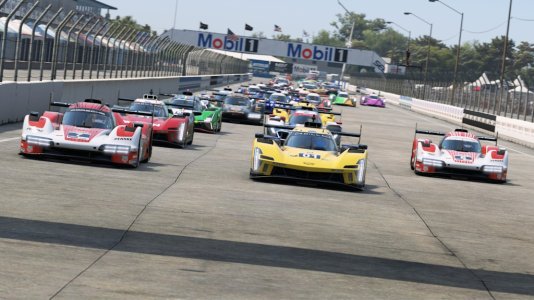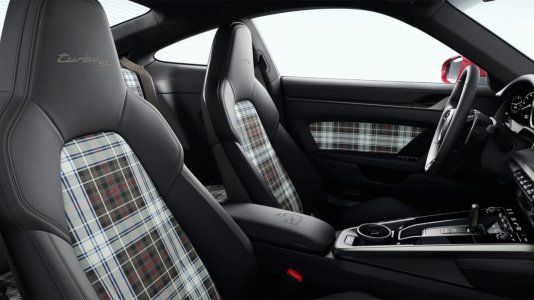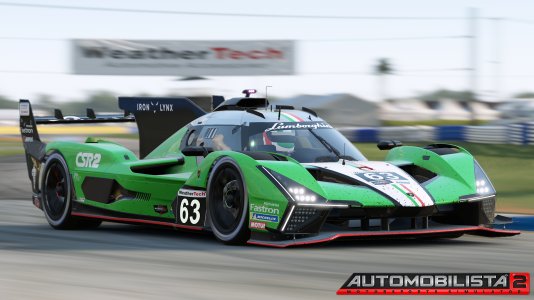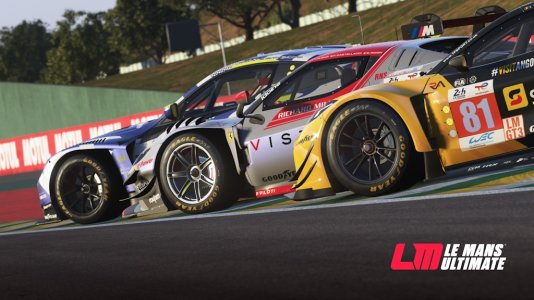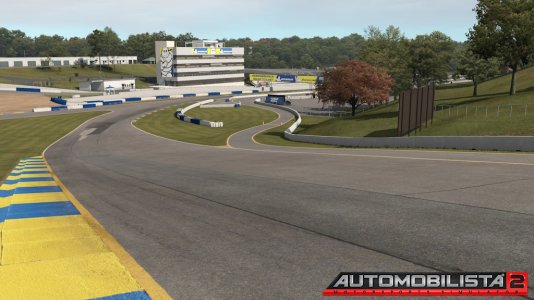Paul Jeffrey
Premium
Visa Vegas eRace winner and Team Redline sim driver Bono Huis recently completed a test in a real Formula E car - prompting the question as to if a virtual driver can make the transition to real life motorsport.
Huis is probably known to a few select sim racers within the sport as one of the many talented pilots of the hugely experienced Redline Racing sim team, the same team that boasts Red Bull Racing Formula One star Max Verstappen as part of it's driving strength.
Huis shot to the forefront of the public conscious recently after winning the very first Visa Vegas eRace event held by Cloudsport and Visa. The race offered up an incredible $1,0000 prize fund for a virtual competition that put together some of the very best sim drivers against the driving talents of the real world FIA Formula E championship. The series, run over several races and finishing in a grand finale at Las Vegas, was run using rFactor 2 software and a third party Formula E mod raced on specially built city tracks designed to mirror the real racing calendar.
Huis would go on to be crowned the overall champion at the end of the day's competition (despite not actually crossing the finish line first) and managed to take home a cool $200,000 USD cheque and promise of a test in a real life Formula E car.
As part of his reward for victory in the Vegas event, Huis recently had his chance behind the wheel of a Faraday Future Formula E car during a private test session in Spain. At present, no information with regards to how Huis adapted to the open wheel racer has been made available, however with the level of promotion and investment that's gone into this whole competition, I'm sure we will likely see a short film of some description released by Cloudsport in the coming weeks.
Although the actual event itself wasn't exactly a brilliant showcase for sim racing and left a little to be desired from a sim racer perspective, it does open up the intriguing question of can a successful sim racer cross over their skills between a real and virtual racing car? I would like to know if a driver with no actual on track experience stands a realistic chance of being able to transition to real life motorsport, with just the aid of a skill set acquired through many thousands of laps on a home simulator.
I think so, within reason.
Let me explain why... every single person who has ever taken part in a motor race of any level has had to start somewhere. We've all had to build up our experience levels to become accustomed to placing a car in a specific position, to applying the throttle in order to make the car move and brakes to slow the machine to a stop. It's literally something we have to do over and over again in order to become experienced. Same with driving a road car at home, no-one is born with that experience, it's earned by physically doing those tasks repeatedly until you become proficient. Now some people are naturally more gifted at the nuances required to do this activity quickly, and these people will have an advantage over their less naturally predisposed fellow competitors. That's usually how sport works and applying ones self to the task at hand in a more diligent manner than our more able rivals can only ever make up for some of that natural disadvantage.
So can laps raced and experience gained on a racing simulator be just as useful to a budding race car driver as a similar level of experience gathered through something such as karting? I think it can, and in some cases I actually think sim experience can prove to be more valuable than time spent behind the wheel of a kart.
A modern piece of simulation software is simply ideal for honing several key tools of a racing drivers armoury, and the opportunity afforded to a sim driver to gather this experience without restrictions of cost / logistics and availability are simply unrivalled. I'm taking mostly about "racecraft" here. The physical act of fighting for track position against a fellow competitor, either from an attacking or defending perspective.
To race in real life and in simulation are remarkably similar experiences, in both situations you have to learn the strengths and weakness of your opponent, you have to analyse where your advantages throughout the lap can be exploited and understand the consequences on both machinery and forward progression should you attempt a move on the car ahead or react to a offensive strike from the driver behind. The physical act of absorbing the data you see and feel and moderating your actions out on track to take best advantage of that data is 100% the same in both situations, a complete 1:1 representation of the real world. This is a big advantage for the sim racer is you can arguably take in upwards of a dozen race events per evening if you so wish, on a wide variety of laserscanned circuits you could conceivably be racing on in real life. Compare this to a real world driver who may only race on a given track once a season, and even then is not guaranteed to find themselves in a wheel to wheel situation under racing conditions. The opportunity for a sim racer to find themselves in an on track battle, and all that it entails, is far higher than one who races solely in the real world. It is a fair assumption then, to say that the sim racer has a better chance of having found themselves in situation X more often than a real life racer, and by consequence the sim racer will of course have had more opportunity to try alternative solutions to said situation, and understand the consequences and loss / reward of those solutions. Including trying things that one would not necessary attempt in a real world situation for fear of loss of time or accident damage. In terms of building up experience and allowing yourself a better chance of reacting on that experience rather than learning as you go, the sim racer holds a key advantage.
Adaptation and making use of the sensations you are feeling is another area a sim racer could potentially find an advantage over a real world driver. Of course a simulation car will probably not react in an identical way to it's real world counterpart on every occasion, but for the purpose of getting into a "car" and understanding that particular car's strengths and weaknesses, then taking it out on a track and learning how those same strengths and weaknesses can interact with the circuit and what the driver must do in order to accommodate them within the lap, are all skills every real world driver must acquire. It really does not matter how true to life the sim car is, because all real cars exhibit different characteristics, the key is honing the ability to spot whatever characteristics your machine has, analyse them, understand them and accommodate them in your driving. Be it a boat, a bus, a car or a plane or even a cardboard box on wheels, the principle is the same. Know how to learn the thing you are driving, and know how to fully understand it's many levels of feedback it gives to you the driver. That is something that takes time to learn, and simmers can speed up that learning curve simply because they can constantly pound round accurate track representations hours on end in many varied machines, broadening their experience and training their brain on how to fully get to know everything different cars tell you. Think of a newly qualified learner driver. They can drive and do everything right, but by the time they have run say 3000 miles in their first car they know everything about that car, compared to the first time backing off the drive at home and everything is alien to them and they don't know what it will do next. Everything at first is a reaction to what is happening because the sheer act of driving is new, despite knowing technically how to drive. Once that ability to feel what the car is telling them, and the senses becoming accustomed to those messages, the level of confidence to go do it again in a totally different car has grown immeasurably. You simply have to train your mind to be able to absorb different information from a car and build up, layer by layer a mental reflex action that informs your limbs what happens before it's happened. Or more to the point, train yourself to actually think in those terms naturally, rather than become too concerned with the physical reactions of the car itself, because a reaction in a sim car will differ from that in a real one. But if you have trained yourself via a sim to know how to "listen" to a car, whatever the message it tells you is irrelevant, so long as you know its going to say something to you.
Another advantage sim drivers should be able to make use of over those with similar experience who don't use a personal simulator, is the experience we can gain in learning a circuit and finding the ideal racing line. Because we in a sim can race against either AI, online against people or attack our own best lap ghost car, we have a luxury of driving nearly endless numbers of laps on any given circuit, many of which are very accurate laser scanned representations of the real thing. This is a big deal and offers a significant opportunity to very quickly shortcut the learning curve a real world driver faces on first visit to a new track. We can see, through professional grade telemetry and racing against our ghost car, every single line variation and its effect on our overall laptimes. This is exceptionally useful to prepare yourself prior to getting out on track, and is also a very useful exercise to train your brain on how to go out and absorb the information you see when in a real car. If you think many of today's youth have grown up with racing games and know all about racing lines, momentum, apexes and that sort of thing. This wasn't necessarily so back in the day before simulations became mainstream. A sim racer now will have an exceptionally good database of knowledge in their mind about what kind of line with achieve what end result, and how to sacrifice speed in certain situations such as corner entry into a tight chicane, to gain a bigger advantage on corner exit. As well as the skill set this teaches us, we also have the advantage of driving the specific track we want to race on over and over and over, imprinting the ideal line into our subconscious minds. Think how useful this is on a track such as the Nordschleife compared to someone who visits it for the first time...
Now don't get me wrong on this, when all is said and done nothing compares to actual physical track experience in a real car, on a real track in a real situation. I'm not saying the best sim racer in the world can step straight into a Grand Prix car or top tier GT team and beat the established names from that series. Not at all. Even established junior drivers in GP2 or Formula Renault 3.5 would struggle to do that. What I am saying is, in my opinion anyway, a competitive virtual racer stands just a good of a chance, if not even a slightly better one in some cases, of entering the grass routes level of racing with no real world experience and doing well as does someone with a long karting career behind them.
The pure visceral experience of driving a real racing car, the noise, the g force, the discomfort, the sense of danger and awareness of other drivers is not really something you can accurately simulate on a consumer simulation. To a point this is a big handicap for a sim racer looking to compete against someone who's maybe had a long time in karting. But to be fair, anyone who has any real racing experience, myself included, will tell you that those elements of the sport are soon forgotten. Give it your first five laps in practice, or after your first proper race and those feelings will fade away rapidly and just become part of the background. Get a couple of real world races under your belt and it's basically forgotten about. As with any sport, once it's performance time you rely wholly on your knowledge, your training, your experience and your raw ability. Outside influences such as the noise and the violence of the experience are of no detrimental affect whatsoever.
Many of the skills needed for a successful real world driver are the same as those of a sim racing driver. If you are a naturally talented racer, then I really do feel the experience gained in a simulator can, in some cases and for certain people, be of exceptional value when you hit the tracks in real life.
As technology continue to improve and real world teams continue to struggle against increasing budgetary concerns I wouldn't be surprised to see simulators becoming more and more prominent in the development of an up and coming racing driver's career.
Do you think experience gained in sim racing can help in real world racing situations? Do you agree with my post above? Let us know in the comments section below!
Last edited:



